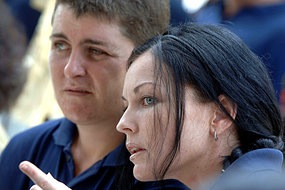Over at the EFA site, Colin Jacobs points out some worrying facts, like the Australian Christian Lobby getting briefed where the Rest of Us cannot be, about the Internet Filter. Here's what he said:
One of the reasons EFA so opposes the Government’s mandatory ISP-level filtering scheme, of course, is that once it’s in place, special interests will be knocking on the Minister’s door seeking to have their own bugbears addressed by the blacklist. Even if, on day one, the list is limited to the “worst of the worst” of violent, illegal material – which it won’t be – how long do you think it would be before AFACT’s lawyers are lobbying for BitTorrent trackers to be added? Even members of Parliament have gone on record with their own ideas of what should be banned, such as racist Flash games, Bill Henson photography or “pro-anorexia” forums.
Now, before the results of the pilot have even been released for public discussion, the Australian Christian Lobby are crowing about how they received a special briefing from the Minister himself on the filtering scheme. Although they say the pilot’s results were not discussed, they clearly received an update on the scheme’s planning, something the rest of us have long been denied. (When was the last time detailed policy information was made available to the public?)
We’ve written before about the confused nature of this policy. Will it act like a home-based filter, keeping age-inappropriate material from children? No. Will it prevent the trade in illegal child pornography? Not that either. We’ve been assured that the list will contain “almost exclusively” RC (refused classification) material, whatever that may mean. Could all adult material be grist for the blacklist? Previous indications have been that this is not the case, but with anti-filth crusaders receiving a special briefing in the Minister’s office, one might have doubts about whether the list might have more puritanical applications than have been disclosed so far.
After all, why should the minister be giving the Australian Christian Lobby, of all the possible stakeholders, a special briefing? They have a right to lobby for their members’ wishes, certainly, but they do not represent a very broad section of the community, and have demonstrated on many occasions an inability to grasp the policy and technological issues surrounding mandatory filtering. Even looking at it cynically, the ACL is hardly a bastion of ALP supporters. Is it because the ACL’s view on how the Internet should ultimately look is in line with the Minister’s?
The Greens have called for an explanation, but sadly if the Government stays true to form we probably won’t be getting one soon.
The Australian electorate demands transparent and evidence-based policymaking that represents broad community interests. EFA will be contacting the Minister’s office in order to get a meeting and again put our concerns with the plan on the record.
I warned you all this was coming. Now that Tony Abbott, the Catholic mouthpiece, is leading the Opposition, we are officially in a nation that is Christianised, and our politics will increasingly marginalise anyone who doesn't meet their religious standards. We are going to have to protest and take legal action to protect our freedoms.



 Are we
Are we 